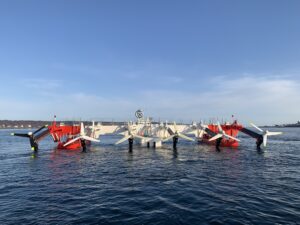The material and production expertise of MD Composites Technology GmbH is needed to drive forward the development of tidal turbine foils (blades) The development project is funded by the Federal Ministry for Economic Affairs and Energy (BMWi) via the Central Innovation Programme for SMEs (ZIM).
The specialist for lightweight components MD Composites Technology GmbH from Ostfriesland and Sustainable Marine Energy from Canada, the expert for maritime renewable energies and the Leibniz Universität Hannover Institute of Production Engineering and Machine Tools are the 3 development partners in this international and transatlantic development project.
The EvoFoil project aims to deliver a range of design innovations to optimise the performance of tidal turbine foils while reducing production and operating costs.
Sustainable Marine will receive research and development funding from the National Research Council of Canada Industrial Research Assistance Programme (NRC IRAP) for the two-year project. In addition, the German partners in this project will receive funding from the German Federal Ministry for Economic Affairs and Energy (BMWi) through the Central Innovation Programme for SMEs (ZIM).
‘The project will address key areas of film design, including tip geometry and overall composition with a new “multi-material” concept. It will allow us to conduct an extensive field and laboratory test campaign, combining decades of knowledge and experience from all industries to take our tidal foil technology to the next level,’ said Ralf Starzmann, Head of Power Systems at Sustainable Marine.
‘Our German partners bring strong expertise in their respective fields, including world-class knowledge from the aerospace and wind energy industries. We believe that there are several important interventions that can be made to further optimise our foil performance and further promote development in the tidal energy market. These design factors will play an important role in areas such as energy harvesting, power curve degradation and operation and maintenance costs, EvoFoil represents another important step in lowering the cost of energy while reinforcing the importance of tidal energy as a competitive future energy source.’
In early 2021, Sustainable Marine launched its new 420kW PLAT-I 6.40 floating tidal energy platform in the Bay of Fundy, Nova Scotia, Canada, which will be part of the world's first floating tidal energy array. The device is currently undergoing operation and testing in Grand Passage before being deployed at the Fundy Ocean Research Centre for Energy (FORCE).
The site experiences some of the most extreme tidal ranges in the world - with 115 billion tonnes of water flowing in and out twice a day - creating a resource that could generate around 7GW of electricity.
‘While the Bay of Fundy provides tremendous natural energy, it also places a range of environmental conditions on the tidal turbine foils, including thermal changes, corrosion and abrasion, and contributes to hydrodynamic loads during operation,’ said Tim Markwald, Managing Director of M&D Composites Technology. ‘Our mission with the EvoFoil project is to drive innovation to work in harmony with these immense natural forces. This includes innovative manufacturing methods to reduce production costs. In addition, we are researching different surface treatments to protect the rotor blades from erosion.’
‘We are currently researching a new material concept to improve the mechanical behaviour of the film and counteract the various stresses,’ said Carsten Schmidt Leibniz Leibniz Universität Hannover Head of the High-Performance Production of CFRP Structures research group.
‘This multilayer concept is influenced by studies on the current carbon fibre reinforced plastic foil structure and the scientific findings of the German Research Foundation's “Multilayer-Insert” project. The innovation will allow the load-bearing areas of the foil to be partially reinforced with thin metal sheets, which will improve the fit to the turbine drive shaft, increasing durability and strength. Intensive work is now underway to manage the increase in scaling and geometric complexity of the metallic inserts and to achieve proper load transfer from the foil root to the turbine hub.’
The project comes at a time when the German and Canadian governments have recently intensified their efforts to explore the joint development of green hydrogen from Canadian renewables for export to Germany. Tidal turbine technology will be able to make a major contribution to this.

Sustainable Marine Adopts German Aerospace and Wind Energy Technology to Advance Tidal Turbine Foils





